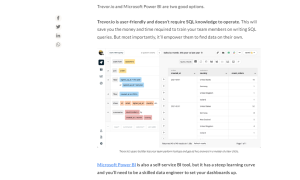Performance management or reviews are probably the most unpopular practices in the workplace. Managers roll their eyes at it while employees shudder at the thought of it. Over the years several companies have tried to add color to the process, giving it a more approachable and feel-good appearance. While some of these attempts have been mildly successful, unfortunately, there’s still an aura of negativity that surrounds performance management. What are some of these myths about performance management that cloud people’s perception? Here’s a look at a few:
Myth 1: Performance Management is about highlighting an employee’s weaknesses
In order for you to grow your career and truly tap into your full potential you need to know what you’re doing best and where you need to polish up. And that’s where performance management discussions can be helpful. It provides you a break from your work to think about yourself and where you’re headed. With the careful guidance of your manager you can get a better understanding of your role and contributions and plan your next steps accordingly.
Myth 2: Performance Management focuses on performance appraisals and promotions
Sure, the tangible outcome of performance management is the salary increase that usually motivates employees, but there’s far more to it. The intangibles, which most of us usually forget, are the feedback, coaching, training and growth discussions that occur. These may not directly translate to a monetary benefit at present, but everything that’s discussed will lead you to a future gain that can come from enhancements in your career. And that’s why it’s important for managers to invest time into these discussions and not rush through them. While for employees, its equally important to absorb the feedback and plan their future.
Myth 3: Performance Management should be scripted (follow a particular guideline)
Just as no two individuals in a team work the same way, behave similarly, or are motivated by the same things, no two performance review meetings can be the same. It’s a customized discussion that is tailored to address each individual’s needs, performance and development. Hence, a formulaic approach to performance management will produce the most unfruitful results, both for the manager and more importantly for the employee.
Myth 4: The process is between a manager and individual employee
While primarily the focus of performance management is to review an individual’s performance, there’s no strict rule that says feedback from all sources can’t be considered. After all, the impact of every employee’s contribution has several recipients – be it their team members, cross-functional peers, cross-functional managers and of course the company as a whole. Hence, taking into consideration, and maybe even inviting others for discussions, can provide vital information to employees about their performance and development.
Myth 5: It’s going to be a short discussion if I’ve met my goals
Meeting your goals and objectives for a defined period is just one piece of the pie. There’s much more to performance management than talking about achievements. Probably of more importance than the past is your future. That’s where such discussions really unfold deeper and more meaningful conservations. Topics such as future expectations, growth potentials, avenues of strength and growth and development plans all come into play.
Myth 6: I’m a star performer if I’ve met all my individual goals
A common misconception is that meeting goals and expectations equates to a job well done. Sure it’s necessary to reach a benchmark achievement, but honestly, that’s just the baseline. A good manager knows to expect more from their team members is what’s in the best interest of the team and company. You’ll need to push the bar higher, aim further and spread yourself wider if you want to be recognized as a top performer. Good managers are always on the lookout for employees who go beyond their call of duty, who are proactive and collaborative and who are in pursuit of their full potential.
Myth 7: Rating an employee low would demotivate them
Rating your team has to be backed by facts and reasoning. You don’t want to be known as the harshest manager nor the most lenient. What you actually want to achieve from the performance management process is vital information about your team members and provide feedback to equip them for future challenges. You definitely want to encourage them but at the same time you have to coach and counsel them as well. Being too lenient just to avoid demotivating your team could produce a backlash in the form of complacency. That’s exactly what you don’t want your team to become – complacent.
The bottom line of what performance management is really about can be summed up into one word – opportunity. It’s an opportunity for managers to spend quality time with their employees discussing future goals, objectives and potential. It’s an opportunity for employees to align their personal ambitions and goals with that of the company and design a path that’ll lead them to future successes and growth. If you can look beyond the common myths about performance management and take a closer look at its purpose you’ll find that it’s a win-win situation for everyone!
Business & Finance Articles on Business 2 Community(108)
Report Post





